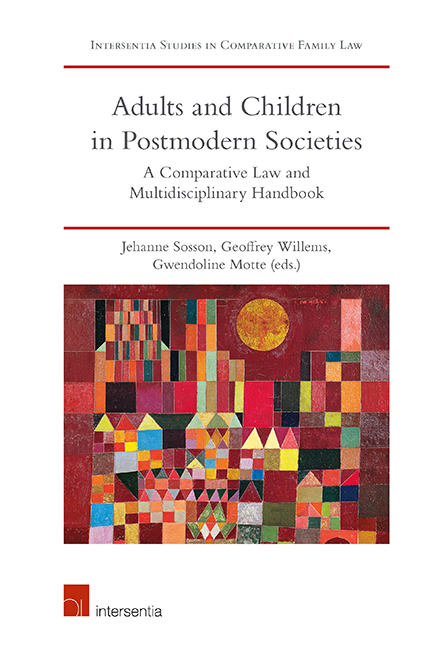Book contents
- Frontmatter
- Contents
- List of Cases
- List of Contributors
- Introduction
- PART I NATIONAL REPORTS ON LEGAL REGULATIONS OF RELATIONSHIPS BETWEEN ADULTS AND CHILDREN
- Questionnaire
- Models
- Algeria
- Argentina
- Australia
- Belgium
- Canada
- Democratic Republic of the Congo
- England and Wales
- France
- Germany
- Ireland
- Italy
- Japan
- The Netherlands
- Romania
- Spain and Catalonia
- Sweden
- Switzerland
- United States of America
- PART II INTERDISCIPLINARY APPROACH
- PART III INTERNATIONAL LAW INSIGHTS
- PART IV COMPARATIVE APPROACH
- General Conclusion: The Challenge of Transparent and Inclusive Parenthood/Parentality in a Pluralist and Cosmopolitan Context
- About the Editors
England and Wales
from PART I - NATIONAL REPORTS ON LEGAL REGULATIONS OF RELATIONSHIPS BETWEEN ADULTS AND CHILDREN
Published online by Cambridge University Press: 26 June 2019
- Frontmatter
- Contents
- List of Cases
- List of Contributors
- Introduction
- PART I NATIONAL REPORTS ON LEGAL REGULATIONS OF RELATIONSHIPS BETWEEN ADULTS AND CHILDREN
- Questionnaire
- Models
- Algeria
- Argentina
- Australia
- Belgium
- Canada
- Democratic Republic of the Congo
- England and Wales
- France
- Germany
- Ireland
- Italy
- Japan
- The Netherlands
- Romania
- Spain and Catalonia
- Sweden
- Switzerland
- United States of America
- PART II INTERDISCIPLINARY APPROACH
- PART III INTERNATIONAL LAW INSIGHTS
- PART IV COMPARATIVE APPROACH
- General Conclusion: The Challenge of Transparent and Inclusive Parenthood/Parentality in a Pluralist and Cosmopolitan Context
- About the Editors
Summary
This contribution considers the legal framework in England and Wales applicable to the creation, regulation and extinguishment of parenthood. The relevant law applied in other jurisdictions within the United Kingdom, namely Northern Ireland and Scotland, is outside its remit.
Judges in England and Wales possess a considerable amount of discretion when determining disputes governing children. Foundational principles in the Children Act 1989 and the Adoption and Children Act 2002, such as the welfare principle and parental responsibility, confer a considerable degree of flexibility on the judiciary. However, in relation to the earlier question of the determination of legal parenthood, the rules applicable are predominately statutory, formulaic and designed to provide certainty.
CHANGES IN THE TRADITIONAL FAMILY
A. MOTHERS
1. Is maternity automatically established by the birth certificate?
As a preliminary point, a key distinction needs to be drawn between parentage (based on the supply of biological material), parenthood (based on who the law deems to be the legal parent) and parental responsibility (based on who possesses the enabling rights and responsibilities in relation to a child).
Leaving aside developments in the context of in vitro fertilisation and artificial insemination, the foundational principle in English law is that maternity attaches to the woman that gives birth to the child. This historically worked well but now is put under considerable pressure following the advent of new reproductive technologies. Thus, as noted in The Ampthill Peerage case: ‘[m]otherhood, although also a legal relationship, is based on a fact, being proved demonstrably by parturition’ or mater est quam gestation demonstrant. Proving maternity is rarely an issue.
Technically, maternity is established as a fact but, under section 2 of the Births and Deaths Registration Act 1953, a mother has an obligation to register the birth of the child within 42 days which provides documented evidence of maternity. Failure to register a birth within that period of time is subject to a fine.
2. Does your jurisdiction recognise any kind of ‘anonymous childbirth’?
Anonymous childbirth is prohibited in England and Wales.
- Type
- Chapter
- Information
- Adults and Children in Postmodern SocietiesA Comparative Law and Multidisciplinary Handbook, pp. 219 - 248Publisher: IntersentiaPrint publication year: 2019

